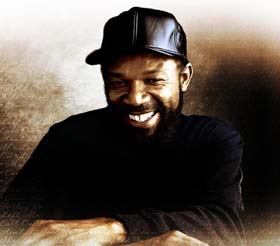Beres Hammond, Marcia Griffiths live!
Beres Hammond, Marcia Griffiths
House Of Blues
Sunday, January 14, 2007

Dancehall reggae, with its rough riddims and often explicit lyrics continues to dominate Jamaica’s music scene but for evidence that singer-songwriters still command influence, one only needs to turn to Beres Hammond. A bespectacled, slight, 50-year-old man who covers his balding head with trademark hats, he’s hardly what you’d expect as a challenger to the most popular reggae genre since the creation of roots reggae. But his gravelly-smooth voice has consistently graced reggae ballads as well as dance hall bubblers for over 30 years and he shows no signs of slowing down. The Jamaican equivalent of Teddy Prendergast in his prime, Hammond attracts feverish girls as well as serious reggae fans with his blend of soulful vocals and articulate lyrics.
Flocks of young women pushed toward the stage as strains of Hammond’s voice floated from backstage. Strolling non-chalantly onstage in narrow jeans, dress shoes, a rolled-sleeved jacket and a newsboy cap perched on his head, he launched into “What Can You Do To Stop A Man From Trying†as euphoric screams filled the venue. Leaping into quick spurts of kicks to punctuate his excitement, he ran through his inexhaustible supply of hits, including “She Loves Me Not,†“I’m Falling In Love All Over Again†and “Pull It Up.†Backed by the crack Harmony House Band, Hammond didn’t get to sing one tune alone, as the standing-room-only crowd sang along with every verse.
The anthemic “Putting Up Resistance†allowed the singer to showcase his husky vocals as he drew the song out with a two-minute a capella treatment. In the middle of “Love Means Never To Say You’re Sorry,†he took a scrap of paper (with a phone number scribbled on it) from a screaming fan and paused to write down his. “You have lovely breasts girl,†he said as he handed it back to her. After caressing the woman’s breasts and commenting on how good they felt, a flurry of papers waved through the crowd as other women attempted to score the crooner’s number too.
It was a clear indication of the limitless appeal of “The King of Lover’s Rock.†His nearly two-hour show featured a dynamic duet with Marcia Griffiths of “I Don’t Have To Worry No More,†there velvety voices blending into surreal harmony. Cramming more recent hits including “They Gonna Talk,†“Rock Away and “Rise and Shine†into the end of performance, he made a point of noting that “it’s time for many things but not for war.†After collecting a passel of photos from fans, he closed his show by explaining, “me and my brother were brought up in the church and I’m proud of that. I’m scared of losing certain things.†He closed by belting out an a capella devotional song, “How D You Say Thank You,†revealing the easy mix of flesh and spirit that powers his popularity.
The queen of reggae music, Marcia Griffiths, proved that she could also compete with Dancehall’s young stars. Swathed in a fiery red leather coat and matching hat, the 60-something icon danced across the stage as her supple vocals rang out classic such as “Give My Love,†“Dreamland†and “I Shall Sing.†“I’d like to remind you that the message is the most important thing and the message is in the music! We’re here to teach, uplift and entertain, reggae music is always positive vibration,†she said.
Her recent hit, “Now You’re Here,†proved to be a great showcase for her smoky-voiced son who sang the duet with her. The classic, “No, No No†had the crowd rockin’ and singing along as did her tribute to Joseph Culture, “I and I Conqueror.†But as a former I-Three, the fans shouted with anticipation for a Bob Marley song and she served up a rollicking version of “Could You Be Loved?†Announcing, “We can’t leave Chicago without the longest running dance in the world,†she called two women on stage as she sang and danced her signature “The Electric Slide,†without missing a single beat.
Film and TV actor Leon opened the show with his group, The Peoples, and proved that he can sing as well as act. His rich vocals mostly tackled a slew of reggaized classics such as Chicago’s “Does Anybody Know What Time It Is?†“Aretha Franklin’s “Til You Come Back To Me†and Smokey Robinson and the Miracles “I Second That Emotion.†The few original tunes from his debut, The Road Less Traveled, were mediocre at best and suggested that he’s a better cover singer than anything else.
— Rosalind Cummings-Yeates
Category: Live Reviews, Weekly












Did anybody attend this? How was Beres?